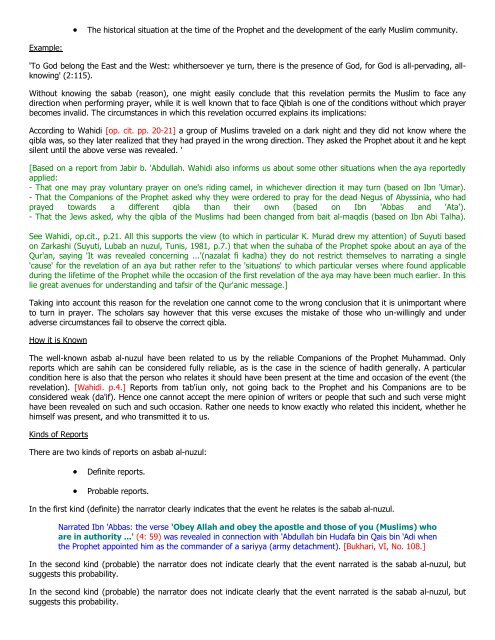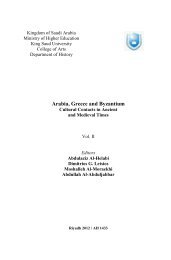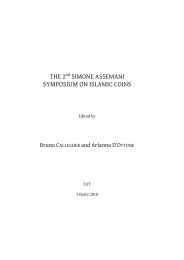ulum-al-quran
ulum-al-quran
ulum-al-quran
You also want an ePaper? Increase the reach of your titles
YUMPU automatically turns print PDFs into web optimized ePapers that Google loves.
The historic<strong>al</strong> situation at the time of the Prophet and the development of the early Muslim community.<br />
Example:<br />
'To God belong the East and the West: whithersoever ye turn, there is the presence of God, for God is <strong>al</strong>l-pervading, <strong>al</strong>lknowing'<br />
(2:115).<br />
Without knowing the sabab (reason), one might easily conclude that this revelation permits the Muslim to face any<br />
direction when performing prayer, while it is well known that to face Qiblah is one of the conditions without which prayer<br />
becomes inv<strong>al</strong>id. The circumstances in which this revelation occurred explains its implications:<br />
According to Wahidi [op. cit. pp. 20-21] a group of Muslims traveled on a dark night and they did not know where the<br />
qibla was, so they later re<strong>al</strong>ized that they had prayed in the wrong direction. They asked the Prophet about it and he kept<br />
silent until the above verse was reve<strong>al</strong>ed. '<br />
[Based on a report from Jabir b. 'Abdullah. Wahidi <strong>al</strong>so informs us about some other situations when the aya reportedly<br />
applied:<br />
- That one may pray voluntary prayer on one's riding camel, in whichever direction it may turn (based on Ibn 'Umar).<br />
- That the Companions of the Prophet asked why they were ordered to pray for the dead Negus of Abyssinia, who had<br />
prayed towards a different qibla than their own (based on Ibn 'Abbas and 'Ata').<br />
- That the Jews asked, why the qibla of the Muslims had been changed from bait <strong>al</strong>-maqdis (based on Ibn Abi T<strong>al</strong>ha).<br />
See Wahidi, op.cit., p.21. All this supports the view (to which in particular K. Murad drew my attention) of Suyuti based<br />
on Zarkashi (Suyuti, Lubab an nuzul, Tunis, 1981, p.7.) that when the suhaba of the Prophet spoke about an aya of the<br />
Qur'an, saying 'It was reve<strong>al</strong>ed concerning ...'(naz<strong>al</strong>at fi kadha) they do not restrict themselves to narrating a single<br />
'cause' for the revelation of an aya but rather refer to the 'situations' to which particular verses where found applicable<br />
during the lifetime of the Prophet while the occasion of the first revelation of the aya may have been much earlier. In this<br />
lie great avenues for understanding and tafsir of the Qur'anic message.]<br />
Taking into account this reason for the revelation one cannot come to the wrong conclusion that it is unimportant where<br />
to turn in prayer. The scholars say however that this verse excuses the mistake of those who un-willingly and under<br />
adverse circumstances fail to observe the correct qibla.<br />
How it is Known<br />
The well-known asbab <strong>al</strong>-nuzul have been related to us by the reliable Companions of the Prophet Muhammad. Only<br />
reports which are sahih can be considered fully reliable, as is the case in the science of hadith gener<strong>al</strong>ly. A particular<br />
condition here is <strong>al</strong>so that the person who relates it should have been present at the time and occasion of the event (the<br />
revelation). [Wahidi. p.4.] Reports from tab'iun only, not going back to the Prophet and his Companions are to be<br />
considered weak (da'if). Hence one cannot accept the mere opinion of writers or people that such and such verse might<br />
have been reve<strong>al</strong>ed on such and such occasion. Rather one needs to know exactly who related this incident, whether he<br />
himself was present, and who transmitted it to us.<br />
Kinds of Reports<br />
There are two kinds of reports on asbab <strong>al</strong>-nuzul:<br />
<br />
<br />
Definite reports.<br />
Probable reports.<br />
In the first kind (definite) the narrator clearly indicates that the event he relates is the sabab <strong>al</strong>-nuzul.<br />
Narrated Ibn 'Abbas: the verse 'Obey Allah and obey the apostle and those of you (Muslims) who<br />
are in authority ...' (4: 59) was reve<strong>al</strong>ed in connection with 'Abdullah bin Hudafa bin Qais bin 'Adi when<br />
the Prophet appointed him as the commander of a sariyya (army detachment). [Bukhari, VI, No. 108.]<br />
In the second kind (probable) the narrator does not indicate clearly that the event narrated is the sabab <strong>al</strong>-nuzul, but<br />
suggests this probability.<br />
In the second kind (probable) the narrator does not indicate clearly that the event narrated is the sabab <strong>al</strong>-nuzul, but<br />
suggests this probability.





